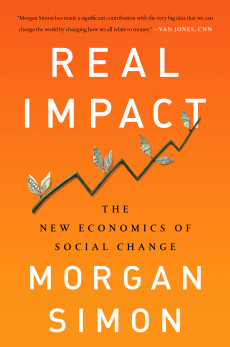Morgan Simon has spent the past 15 years building bridges between the worlds of finance and social justice. From working in close partnership with marginalized communities around the world to serving as managing director of the Candide Group, where she currently supports members of the Pritzker family on behalf of the Libra Foundation, Simon has been paying close attention to the values at work in the way money is invested.
Her experience, knowledge, and passion in guiding wealthy families, foundations, and financial institutions coalesce powerfully in her first book, Real Impact. She documents the learning process that led her to work in impact investing and social activism, and how it informed her nuanced understanding of the many unaddressed issues that limit systemic change.
Simon’s book is about the myopia she sees in the impact investing field. She calls out the short-sightedness that frames impact investment as “alleviating poverty” (a short-term fix) rather than “creating value.” She challenges the inability of its players to question the effectiveness of the “free-market-pluscharity model” in producing global prosperity, and its tendency to tolerate, if not replicate, the extractive practices of finance.
Simon draws from her own experiences to support these insights. As a Swarthmore student doing aid work in Sierra Leone, she encountered a street vendor selling a can of tuna that was labeled as a gift from the Japanese government and “not for sale.” She paid the vendor $1 for it—an amount that could buy five full meals in Sierra Leone—and realized that the tuna generated far more economic value for the people who had fished for it, donated it, and sold it than it had for its intended beneficiaries. Simon knew “in that moment that if I pursued a career as an aid worker, the balance of my life’s work was going to create much more value for those with power than those without it.”
Since then, as cofounder of the Responsible Endowments Coalition, Toniic, and Transform Finance, Simon has emerged as a leading reformist challenging impact investors to eschew “easy Band-Aid solutions” and avoid repeating the mistakes of the conventional finance world. She points out that Americans often unquestioningly work and consume in sectors that are damaging to the very social causes they support via volunteerism or charity. And she notes that US foundations are legally required to give away only 5 percent of their resources to charitable causes and often spend the other 95 percent in money-generating investments that operate in “[contradiction] with their stated missions.” Even in the well-meaning arena of impact investing, she shows, a “topdown” structure ensures that those on the “doing well” side of the equation often benefit exponentially more than those on the “doing good” side. The habits and incentive structures of the finance world are so entrenched that even the most benevolent are often blind to how they contribute to power imbalances counter to the systemic change they seek.
Simon’s solution for countering this myopia is for us to view the world with a bigger lens—one that’s both focused enough to clarify patterns of power and wide enough to bring other people and their concerns into view. In chapter 5, the linchpin of the book, she offers what she calls her Transform Framework, composed of three simple but far-reaching principles that originated from a three-hour conversation with change activists at the World Social Forum. They are:
- Engage communities in design, governance, and ownership.
- Add more value than you extract.
- Fairly balance risk and return between investors, entrepreneurs, and communities.
This framework was designed not as a list of rules but as a prompt to help investors ask the right questions: “What resources are being created through investments, and are they good for people and the planet? … Who is making money from an investment, and what are they choosing to do with it? … How does one replace historically stolen resources within communities in a way that enhances autonomy?”
In subsequent chapters, Simon offers detailed examples of how the framework has been used to ensure transformative impact, in cases ranging from renewable energy projects in Mexico to worker-owned cooperatives in Argentina. The book also provides ample, disheartening evidence that many impact investors fail to treat the communities they serve as more than inputs—to “empower, not exploit!”—and fall prey to the practice of placing themselves above “those people.”
Real Impact is a clarion call to impact investors and a guide for those who genuinely want to do good and do it better. The book covers a lot of ground, speaks to several audiences, and is overflowing with actionable advice for each of them. Its concluding chapter, which guides and encourages investors and social entrepreneurs to create a “pathway of connection” to the communities they are affecting, almost reads like an etiquette guide for white allies.
At times, Simon’s desire to speak to everyone seems excessive. But the book was devised to educate both impact investors and those interested in social change around impact investing. Simon’s message comes from someone steeped in social activism and is one that impact investors must take to heart, as well: “Take your lead from the affected community you seek to serve,” it says. “And not just for the benefit of others, but for your own liberation, as well.”


